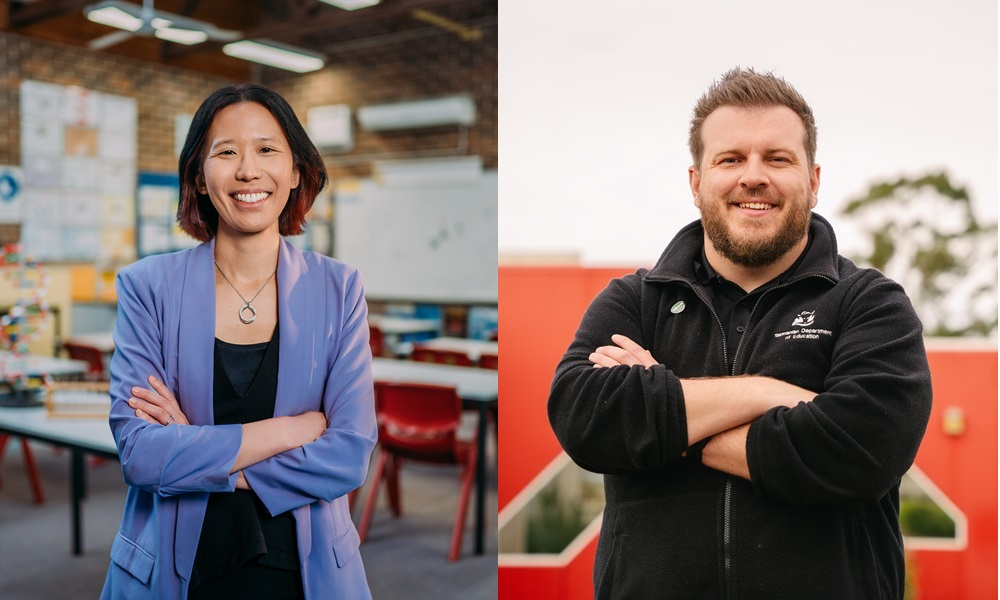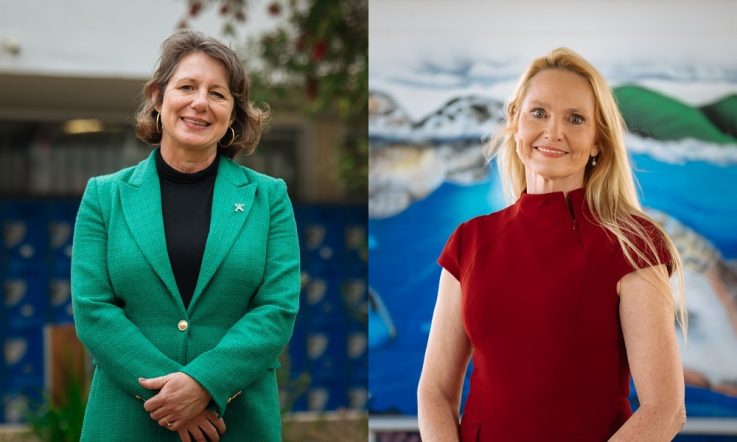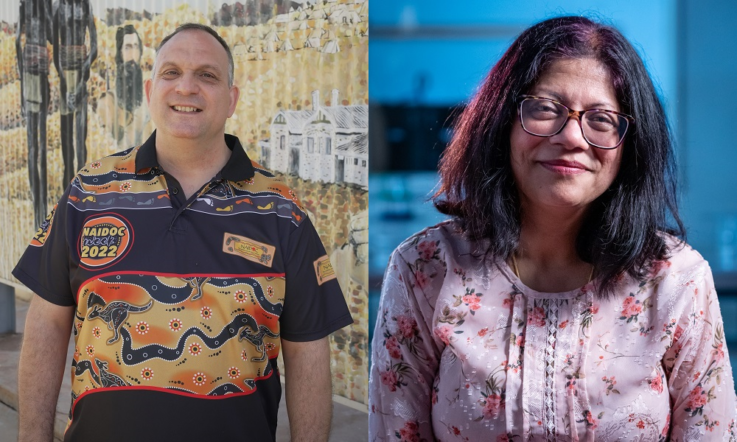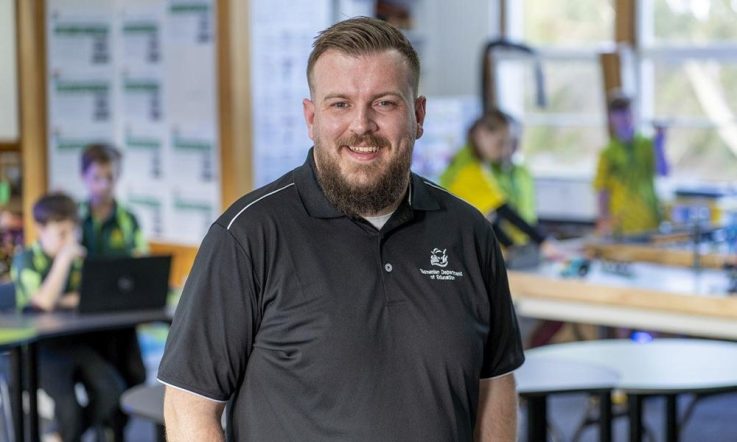The 2024 winners of the annual Prime Minister’s Prizes for Science were announced last night at a presentation event at Parliament House. In total, 7 prizes were awarded, including 2 for Excellence in Science Teaching.
Daniel Edwards from Montello Primary School in Tasmania has received the Prime Minster’s Prize for Excellence in Science Teaching in Primary Schools, and Alice Leung from Concord High School in New South Wales has received the Prime Minister’s Prize for Excellence in Science Teaching in Secondary Schools.
The Prime Minister’s Prizes for Excellence in Science Teaching recognise and celebrate the role primary and secondary educators play in inspiring and encouraging students to take up an interest and consider careers in STEM. Let’s find out more about the 2 winners for 2024.
Daniel Edwards – Montello Primary School, Tasmania
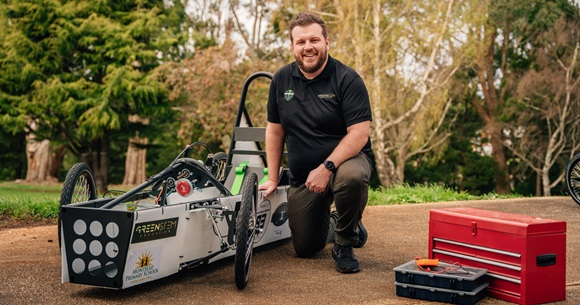
Daniel Edwards. Image: Supplied.
Daniel Edwards is a STEM teacher at Montello Primary School in Tasmania and has been recognised for encouraging all students, regardless of their background, to engage with STEM subjects and consider a career in science. Montello Primary School has many students from lower socioeconomic backgrounds, and his development of a STEM and Digital Technologies Program has seen an unprecedented increase in student engagement and achievement in STEM.
Edwards also mentors local educators in effective STEM teaching and learning practices, and teaches Digital Technologies at Parklands High School in Tasmania.
On top of this, he is the founder and CEO of GreenSTEM Education, Tasmania’s first STEM education-focused charity that works to provide equitable access to STEM education to young people, especially those from underrepresented backgrounds. Through GreenSTEM, he runs STEM Unlimited, a free after-school club open to all students in the region.
‘I take a student-centred approach to STEM education,’ Edwards says. ‘I aim to empower my students to apply their learning to solve relevant problems, create projects they’re passionate about, and connect to their experiences.’
‘One of the best things about my job is seeing STEM education break down barriers so that students can achieve amazing things. One of the most encouraging pieces of feedback I’ve ever received was a note from a student who said I help make things come true that they didn’t even realise were possible.’
Principal at Montello Primary School, Dion McCall, says: ‘Mr Edwards facilitates opportunities for upper primary students to drive their own learning to solve real problems of interest or concern to them. One example of this involves the Young Leaders of Tasmania, where he supported students to develop functional assistive technology (a 3D printed deodorant holder) for a student with disability.’
Earlier this year, Teacher spoke with Edwards about the value of teaching STEM as a subject.
Alice Leung – Concord High School, New South Wales
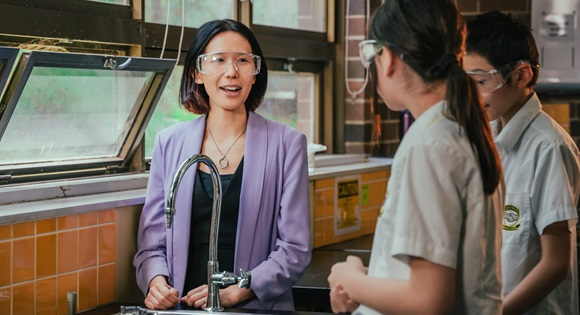
Alice Leung. Image: Supplied.
Alice Leung, Head Teacher, Secondary Studies at Concord High School in Sydney, has been recognised for her creative and innovative approach to teaching, which draws on real-life issues such as ecology, food security and health to teach abstract concepts in practical ways.
‘I’m extremely humbled to receive the 2024 Prime Minister’s Prize for Excellence in Science Teaching in Secondary Schools. It’s a wonderful opportunity to promote the importance of science teaching. Without teachers, we wouldn’t have our next generation of scientists,’ Leung says.
At Concord High School, 70% of students are from a non-English speaking background. Leung has been acknowledged for work in supporting culturally and linguistically diverse students, having created a program to teach technical scientific vocabulary to these students.
She has also encouraged female students’ interest in STEM, through the creation of a Minecraft Club to allow female students to explore coding for game design and understand how mathematical concepts are represented in a digital environment.
Leung also prioritises embedding Aboriginal and Torres Strait Islander perspectives in her teaching. ‘When we are learning about astronomy, we integrate their history and knowledge in terms of how they’ve used the stars to navigate the skies, which is different to western science,’ she says.
To support students to consider a career in STEM, she hosts STEM careers fairs at Concord High School with industry and academic experts. She also works closely with other educators – whether it’s mentoring new science teachers, sharing resources with fellow educators nationwide, or connecting teachers and experts from the science industry through social media.
Principal at Concord High School, Victor Newby, says: ‘Ms Leung is a positive, engaged and inspirational leader across our school and more broadly across the scientific community. She has been a vital part of our whole school professional learning team.’
The Prime Minister’s Prizes for Science are celebrating 25 years this year. Teacher has spoken with many previous winners of the Prizes for Excellence in Science Teaching, including: 2023 winners Donna Buckley and Judith Stutchbury, 2022 winners George Pantazis and Veena Nair, 2021 winners Megan Hayes and Scott Graham, 2020 winners Sarah Fletcher and Darren Hamley, 2019 winners Sarah Finney and Dr Samantha Moyle, 2018 winners Brett Crawford and Dr Scott Sleap, and 2017 winners Neil Bramsen and Brett McKay.
Both Daniel Edwards and Alice Leung prioritise sharing real-life, relevant problems with students in STEM. As a STEM teacher, think about an upcoming topic you’re teaching. How can you incorporate classroom activities that reflect real-life situations?
